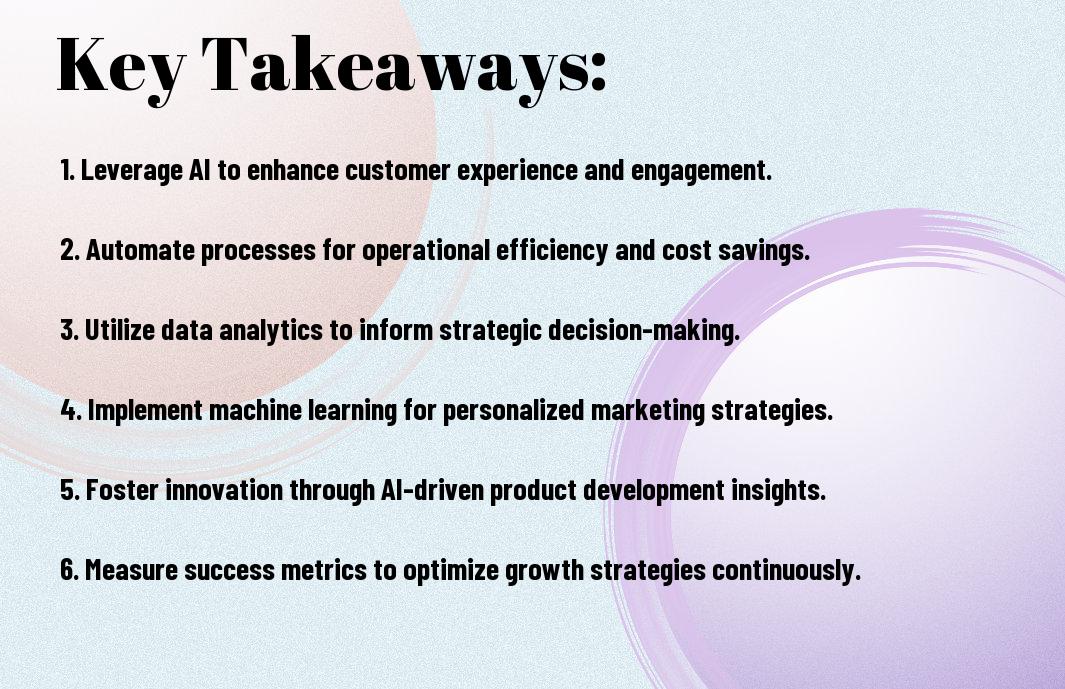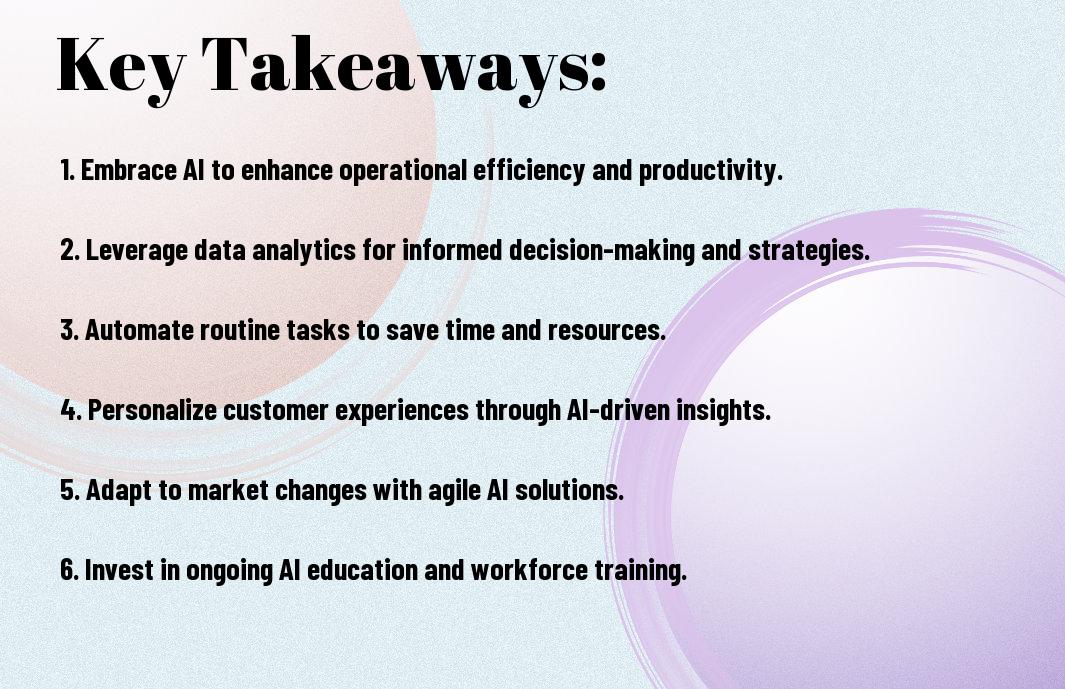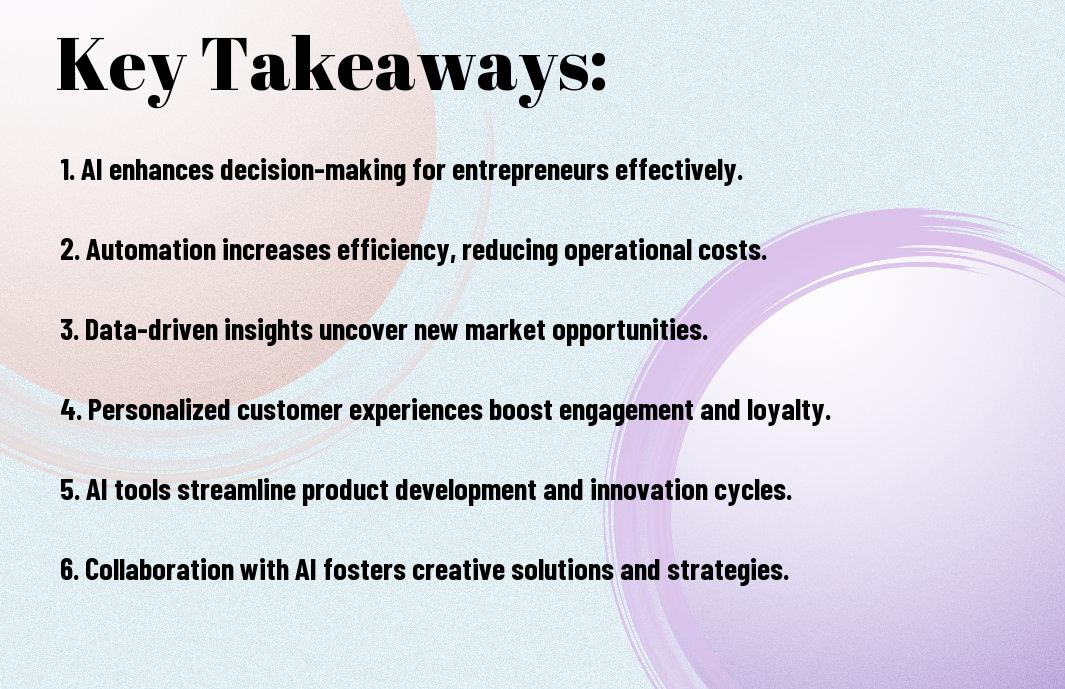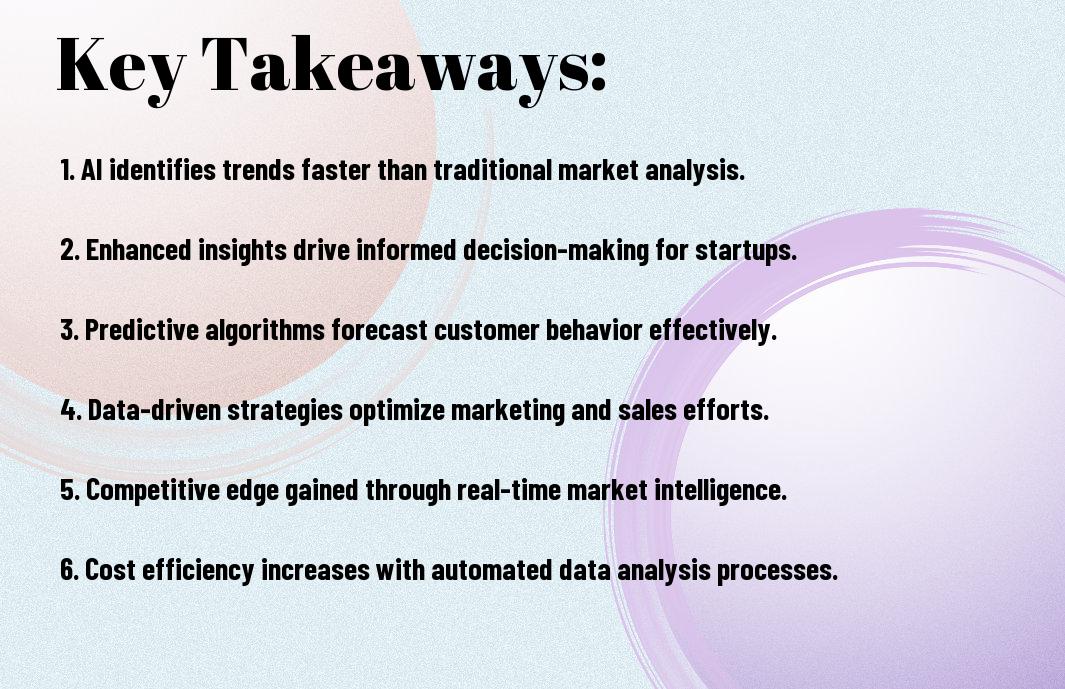As you navigate the competitive business landscape, you’re likely seeking innovative ways to drive growth and boost financial success. You understand that leveraging cutting-edge technologies is key to staying ahead of the curve. With the power of Artificial Intelligence (AI) at your fingertips, you can revolutionize your business operations, streamline processes, and unlock new opportunities for expansion. By embracing AI techniques, you can make data-driven decisions, optimize resources, and propel your business towards rapid growth and financial prosperity.
Key Takeaways:
- Implementing AI techniques can significantly accelerate business growth by automating processes, enhancing decision-making, and improving customer experiences, ultimately leading to increased revenue and financial success.
- Effective scaling of AI solutions requires a strategic approach, including identifying key areas of business that can benefit from AI, developing a robust infrastructure, and ensuring seamless integration with existing systems.
- By leveraging AI-driven insights and analytics, businesses can gain a competitive edge, drive innovation, and make data-driven decisions to navigate complex market landscapes and achieve sustainable growth.
The AI-Driven Business Landscape
Your business operates in a world where artificial intelligence (AI) is increasingly driving growth and financial success. You need to understand the AI-driven landscape to stay competitive and achieve your goals.
Current Market Dynamics
Between the rise of digital transformation and the growing demand for data-driven insights, you are likely to encounter a complex market environment that requires innovative solutions to stay ahead.
Technology Integration Points
Beneath the surface of your organization, there are numerous opportunities to integrate AI technologies that can enhance your operations and decision-making processes.
For instance, you can leverage AI-powered tools to automate routine tasks, analyze customer behavior, and optimize your supply chain, leading to increased efficiency, improved customer satisfaction, and reduced costs, ultimately driving your business towards rapid growth and financial success.

Smart Scaling Fundamentals
One of the key aspects of scaling your business is understanding the fundamentals that drive growth. You need to focus on strategies that will help your business expand rapidly while maintaining financial stability. Your goal is to create a solid foundation for long-term success, and this requires careful planning and execution.
Data-Driven Decision Making
Decisively, you will need to rely on data to make informed decisions that drive your business forward. You should utilize analytics and metrics to understand your market, customers, and operations, allowing you to make adjustments and optimizations that support your growth strategy.
Automation Architecture
After establishing a solid foundation, you can start building an automation architecture that streamlines your operations and increases efficiency. You should identify areas where automation can have the greatest impact and implement solutions that support your growth goals.
Hence, as you develop your automation architecture, you will need to consider the specific needs of your business and the technologies that will best support your goals. You should evaluate various automation tools and platforms, and select those that integrate seamlessly with your existing systems, allowing you to automate tasks, processes, and workflows with ease, and freeing up resources to focus on high-value activities that drive growth and innovation.
Financial Intelligence Systems
Many businesses are now leveraging financial intelligence systems to drive growth and success. You can utilize these systems to make informed decisions, optimize operations, and improve your bottom line. By implementing financial intelligence systems, you can gain valuable insights into your financial performance and make data-driven decisions to drive your business forward.
Predictive Analytics for Growth
Gaining insights into future trends and patterns is imperative for your business growth. You can use predictive analytics to forecast revenue, identify new opportunities, and optimize your operations. By leveraging predictive analytics, you can make informed decisions and stay ahead of the competition, driving your business towards rapid growth and financial success.
Risk Management Protocols
Balancing risk and opportunity is a delicate task for your business. You need to navigate between potential risks and opportunities to ensure sustainable growth. By establishing effective risk management protocols, you can minimize potential losses and maximize gains, protecting your business from unforeseen circumstances.
With effective risk management protocols in place, you can identify potential risks, assess their impact, and develop strategies to mitigate them. You can use data analytics and machine learning algorithms to identify patterns and predict potential risks, enabling you to take proactive measures to protect your business and ensure long-term financial success.
Customer Experience Enhancement
Unlike traditional methods, AI-driven approaches can significantly enhance your customer experience, leading to increased loyalty and retention. You can leverage AI to analyze customer data, preferences, and behaviors, enabling you to tailor your services to meet their unique needs.
AI-Powered Personalization
To take personalization to the next level, you can utilize AI algorithms that learn from customer interactions and adapt your offerings accordingly, ensuring a highly customized experience that drives engagement and satisfaction.
Digital Touchpoint Optimization
Similarly, personalization extends to optimizing your digital touchpoints, where you can use AI to streamline and refine your online presence, making it more intuitive and user-friendly for your customers to interact with your brand.
Understanding how your customers interact with your digital touchpoints is key to optimizing their experience. You can use AI to analyze customer journeys, identify pain points, and make data-driven decisions to improve your website, mobile app, or social media channels, ultimately leading to increased conversions and revenue growth for your business.

Operational Excellence
Despite the complexity of scaling a business, achieving operational excellence is within your reach. You can leverage AI techniques to streamline processes, enhance efficiency, and reduce costs, ultimately driving your business towards rapid growth and financial success.
Process Automation Strategies
Any organization can benefit from automating repetitive and mundane tasks, freeing up your team to focus on high-value activities. You can utilize AI-powered tools to identify areas where automation can have the greatest impact, allowing you to optimize your operations and improve productivity.
Resource Allocation Models
Across your organization, effective resource allocation is important for achieving operational excellence. You can use AI-driven models to analyze your resources, identify areas of waste, and optimize allocation to maximize ROI and drive business growth.
Indeed, by implementing advanced resource allocation models, you can gain valuable insights into your business operations, enabling you to make data-driven decisions and allocate resources more efficiently. You can use AI to analyze your resource utilization patterns, forecast demand, and predict potential bottlenecks, allowing you to proactively adjust your resource allocation and ensure that your business is running at optimal levels.
Market Expansion Tactics
Keep expanding your business with smart market expansion tactics, as discussed in Part 2: Scaling Smarter, Growing Faster – A Framework & AI Driven Approach, to achieve rapid growth and financial success.
AI-Based Market Analysis
Markets are constantly evolving, and you can leverage AI-based market analysis to identify new opportunities and stay ahead of the competition, enabling your business to make informed decisions.
Scaling Across Territories
Any business can scale across territories with the right strategy, and you can use AI techniques to analyze market trends and expand your customer base.
Due to the complexity of expanding into new territories, you will need to develop a tailored approach that takes into account local market conditions, cultural differences, and regulatory requirements, allowing you to successfully scale your business and achieve financial success.
Summing up
To wrap up, you now have the tools to leverage AI for rapid business growth and financial success. You can apply these techniques to scale your business smartly. For inspiration, you can explore How 6 mid-market companies are using AI to scale and learn from their experiences to drive your own business forward.
FAQ
Q: What is Scaling Smart, and how can it benefit my business?
A: Scaling Smart refers to the strategic application of Artificial Intelligence (AI) techniques to drive rapid business growth and achieve financial success. By leveraging AI, businesses can automate processes, gain data-driven insights, and make informed decisions to stay ahead of the competition. With Scaling Smart, companies can optimize their operations, improve customer experiences, and increase revenue, ultimately leading to sustainable growth and profitability.
Q: How can AI techniques be applied to drive business growth and financial success?
A: AI techniques can be applied in various ways to drive business growth and financial success, including predictive analytics, machine learning, and natural language processing. These techniques can help businesses identify new opportunities, optimize marketing campaigns, and improve customer engagement. Additionally, AI-powered tools can automate tasks, enhance supply chain management, and provide real-time insights to inform strategic decision-making.
Q: What are the key challenges that businesses may face when implementing AI techniques for scaling?
A: Businesses may face several challenges when implementing AI techniques for scaling, including data quality issues, lack of skilled talent, and integration with existing systems. Moreover, ensuring transparency, accountability, and ethics in AI decision-making can be a significant challenge. To overcome these challenges, businesses must invest in data infrastructure, develop a skilled workforce, and establish clear guidelines for AI adoption and governance.
Q: How can businesses measure the effectiveness of AI techniques in driving growth and financial success?
A: Businesses can measure the effectiveness of AI techniques by tracking key performance indicators (KPIs) such as revenue growth, customer acquisition costs, and return on investment (ROI). Additionally, metrics like customer satisfaction, retention rates, and net promoter scores can help evaluate the impact of AI on customer experiences. Regular monitoring and analysis of these metrics can help businesses refine their AI strategies and make data-driven decisions to optimize their growth and financial performance.
Q: What is the future of Scaling Smart, and how will AI continue to evolve in driving business growth and financial success?
A: The future of Scaling Smart is promising, with AI continuing to play a vital role in driving business growth and financial success. As AI technologies advance, businesses can expect to see increased adoption of emerging technologies like edge AI, explainable AI, and autonomous systems. Furthermore, the integration of AI with other technologies like blockchain, IoT, and cloud computing will create new opportunities for innovation and growth. To stay ahead, businesses must stay agile, invest in ongoing learning and development, and prioritize AI-driven innovation to drive sustainable growth and financial success.












